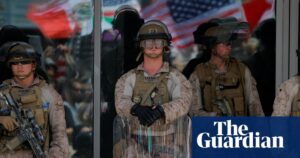
In a controversial move that has stirred political and public debate, President Donald Trump has doubled down on his decision to deploy military forces in Los Angeles. This action, aimed at addressing what he describes as “the enemy within,” has drawn widespread criticism from political leaders, military officials, and citizens alike. The deployment, which began earlier this month, coincided with massive protests against the administration’s immigration policies, and has raised questions about the appropriate use of military power on American soil.
President Trump’s decision to send thousands of National Guard troops and U.S. Marines into Los Angeles was initially met with shock, though it has largely been overshadowed by international developments. The troops have maintained a low profile, primarily tasked with guarding federal buildings and supporting immigration enforcement operations. However, the presence of military forces in the city has unsettled California’s political leaders and national Democratic figures, who fear the precedent it sets.
Political and Military Backlash
The deployment has not only sparked political outrage but has also been criticized by high-ranking military officials. A group of retired four-star generals and admirals, alongside former Pentagon officials, issued a statement condemning the use of military forces for domestic political purposes. They argue that such actions “put both service members and civilians at risk of harm and violate longstanding constitutional limits on government power.”
Among those voicing opposition is Michael Hayden, a retired Air Force general and former head of the National Security Agency and Central Intelligence Agency. He, along with other military leaders, is part of a lawsuit seeking to reverse the deployment. The suit contends that the military’s involvement in domestic affairs is both inappropriate and dangerous.
“The U.S. military exists to defend the nation from foreign threats, not to police American streets or intervene in political disputes at home,” the statement read.
Historical Context and Legal Challenges
The use of military forces within the United States is not without precedent, though it is rare. Historically, the Insurrection Act has been invoked to quell civil unrest, most notably during the 1992 Los Angeles riots. However, President Trump has opted for a less aggressive approach, invoking a rarely used power to mobilize the military to “temporarily protect” federal property and personnel.
This decision has led to legal challenges from California, which argues that the president exceeded his authority. Although a district judge initially ruled in favor of California, an appeals panel later reversed the decision. The state contends that the deployment undermines the separation between military and civilian activities, a boundary that has been increasingly blurred in recent years.
Several states have used the National Guard for non-traditional roles, such as border patrol duties and substitute teaching, further complicating the legal landscape. Critics argue that these deployments are inappropriate, especially when driven by partisan motives and against the wishes of state governors.
Implications and Future Concerns
As the deployment continues, concerns about its implications for civil-military relations grow. Experts warn that the presence of military forces in politically charged situations risks escalating tensions and undermining democratic norms. Chris Mirasola, a national security expert at the University of Houston Law Center, cautions that the deployment itself is “escalatory” and could lead to unintended consequences.
“The risk of escalation, or of someone making a mistake, is always present and in these situations actually quite high,” Mirasola noted.
Meanwhile, the Trump administration remains steadfast in its commitment to maintaining the military presence in Los Angeles. Defense Secretary Pete Hegseth has stated that the troops will remain for at least 60 days to ensure that “rioters, looters, and thugs” do not disrupt order. This stance has fueled fears of further military involvement in domestic affairs, particularly as tensions with Iran continue to rise.
The situation in Los Angeles serves as a stark reminder of the delicate balance between maintaining order and preserving democratic principles. As the legal battles unfold and political debates intensify, the future of military deployments on U.S. soil remains uncertain. For now, the eyes of the nation are on Los Angeles, where the implications of this unprecedented move continue to unfold.






